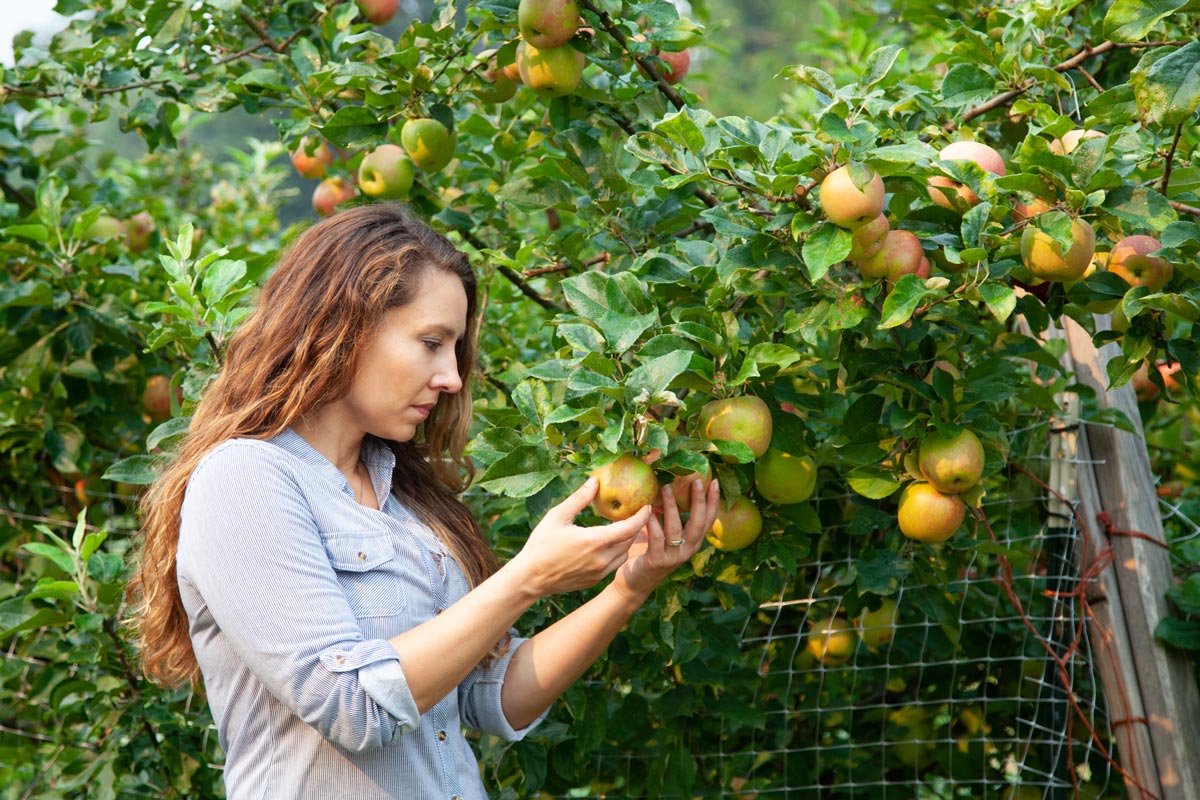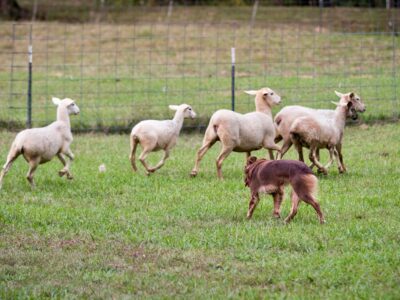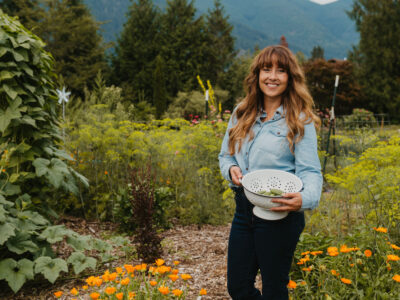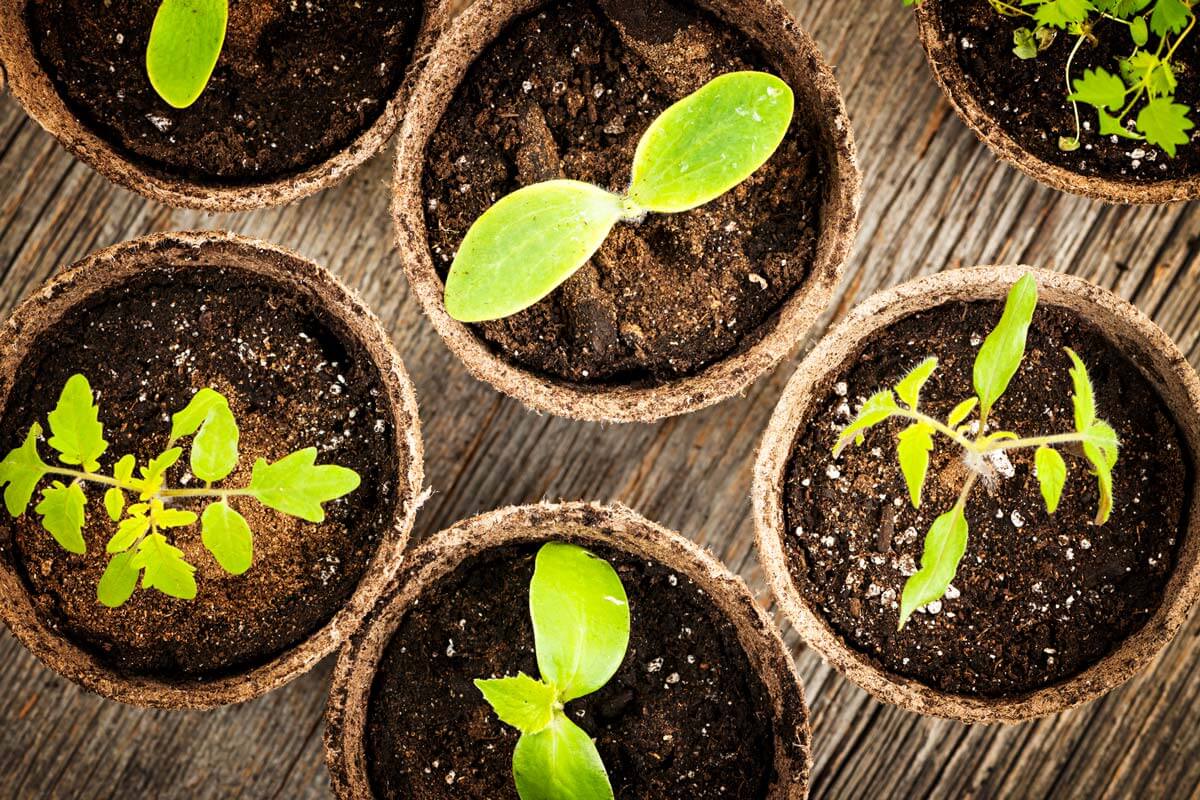Want to grow your own fruit trees? Join me as we discuss not only how to grow fruit trees but how to grow them fast. Learn from this post (and podcast) to avoid costly mistakes in growing fruit trees on your property, as well as which fruit trees are right for your area and when to plant where you live.
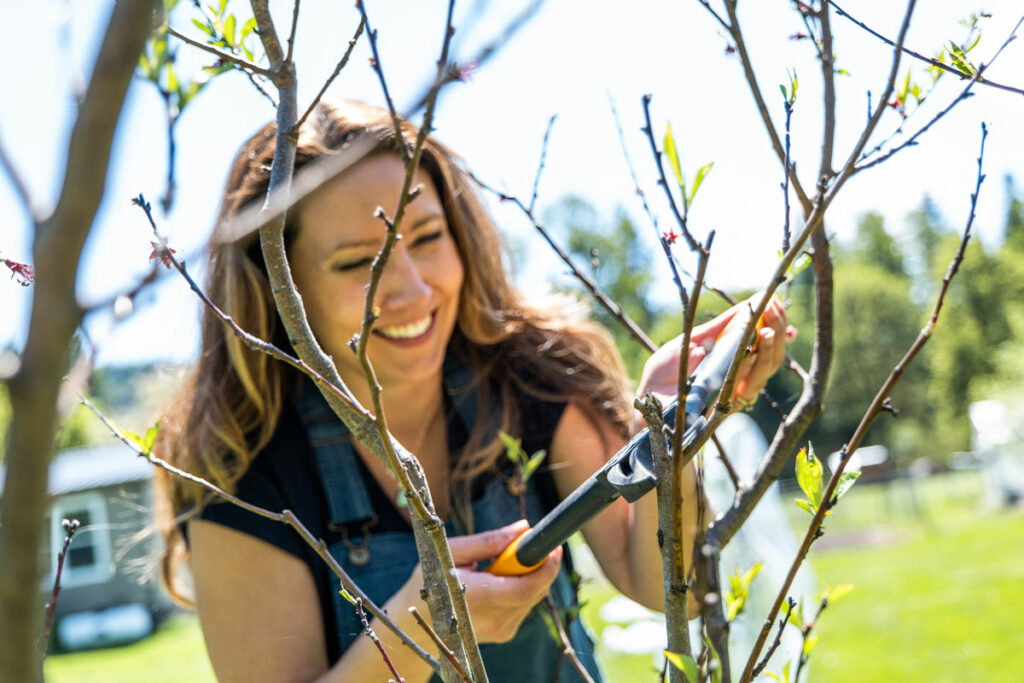
If you're new to fruit trees, this is a great post to start with. However, you may also want to check out my posts on how to plant fruit trees, how and why to plant a fruit tree guild, how to prune apple trees, how to care for fruit trees in the fall and winter months, how to grow fruit trees in pots (for those of us wanting to grow citrus in the northern climates!), and how to treat your fruit trees for pests (organically).
Between all these posts, you should be growing your own nut trees and fruit trees with great success, no matter where you live.
This blog post has been updated to include multiple podcast episodes. The first is with Angie, a homesteader from Texas with an awesome tool to help you grow your own food. She's sharing her tips in Pioneering Today Podcast episode #51 – How to Grow Fruit Trees.
Susan Poizner is joining us in Pioneering Today Podcast episode #424 – Growing Fruit Trees Fast! (Embedded at the top of this post.)
You can learn how many fruit trees and berry bushes you need to plant per person in Pioneering Today Podcast episode #230.
And finally, my podcast on 5 Tips to Starting an Orchard which is Pioneering Today Podcast episode #169. As you can tell, I've covered this topic extensively. So this blog post is your one-stop-guide for all things growing fruit trees.
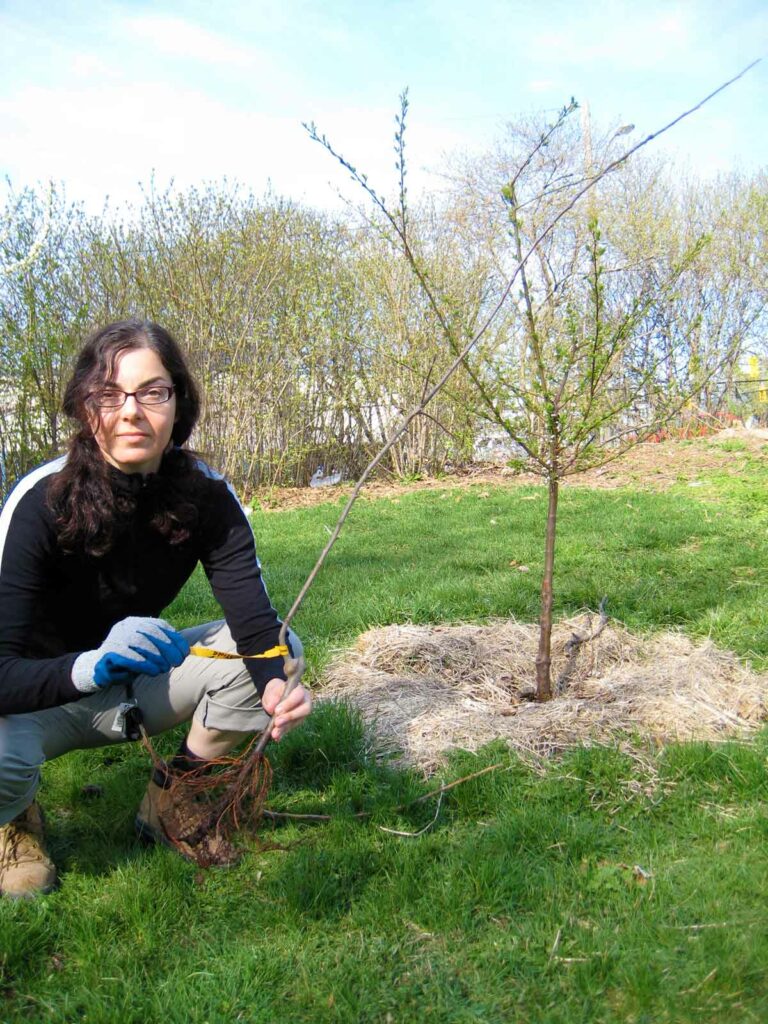
About Susan Poizner
Susan Poizner is an urban orchardist and fruit tree care educator from Toronto, Canada. She's the founder of the award-winning website OrchardPeople.com. Susan shares insights on organic fruit tree care, food forests, and permaculture.
Her goal is simple: to empower everyone to grow fruit trees successfully. An ISA Certified Arborist, Susan also travels across North America as a keynote speaker, teaching gardeners, arborists and home growers how to grow fruit trees that thrive.
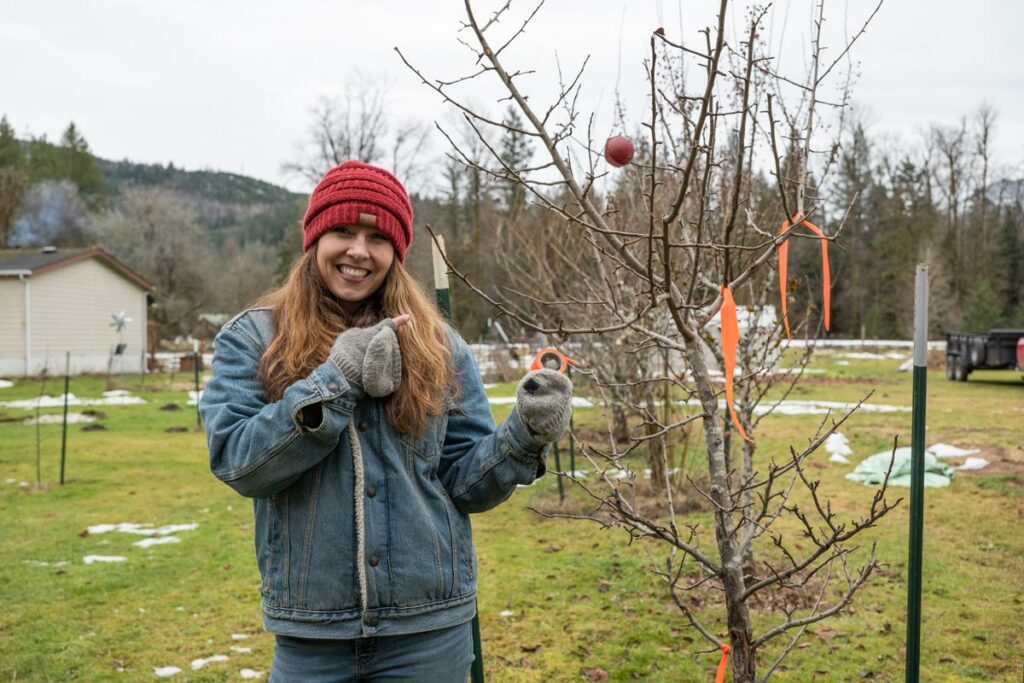
Benefits of Planting Fruit Trees
One of the benefits of fruit trees is that they are perennials. That means we plant once, and year after year after year, it provides us with fruit without us ever having to seed start or plant it again. Now, that's assuming the right variety was chosen and that it was put in the right spot when planted.
Whether it's cherry trees, pear trees, peach trees, fig trees or some other kind of fruit tree, I think you'll find this guide helpful.
Growing Fruit Trees From Seed
I don’t actually like to grow nut trees or fruit trees from seed, and the reason is that you’re going to be adding that many more years before they begin to produce fruit (usually the bare-root trees or saplings you buy at a nursery are already 2-3 years old).
Another reason is that, depending upon the variety of fruit trees, when you plant them from seed, you don’t always get the same variety.
So, to make sure that I’m getting the exact fruit variety that I want, I like to start with some immature, bare-root fruit trees that I transplant precisely where I want to plant them.
Sizes of Fruit Trees
But, first, let's talk about the different sizes and types. There are three sizes of fruit trees to choose from:
- Dwarf & Miniature
- Semi-Dwarf
- Standard
Dwarf and Miniature
These are the smallest and most compact fruit trees. They usually get between 8 to 10 feet tall and wide upon maturity. The size of the fruit is not dwarf, just the size of the tree.
Benefits of a Dwarf Fruit Tree
- The good thing about a dwarf tree is they sometimes produce fruit sooner than their larger counterparts. Possibly within as little as two years, similar to berries.
- They are excellent candidates for growing in containers.
- You don't need a ladder, so there's no climbing. They don't get super tall.
- They're easier to prune and maintain.
Cons of a Dwarf Fruit Tree
- They have a shorter life span, usually 15 to 25 years versus the standard variety, which is 50 years plus.
- Smaller harvest. Not because the fruit is smaller, but because the tree is smaller meaning there isn't as much fruit to harvest from it as you would get from a semi-dwarf or standard variety.
Semi-Dwarf
Semi-Dwarf trees are right in the middle and grow 12 to 15 feet tall and wide. This depends upon the root stock. Some may get a little bit taller, closer to 18 and 20 feet, but on average, upon maturity, you might need a ladder to harvest at the very top of the tree. Semi-dwarf is what we have on our homestead.
Benefits of a Semi-Dwarf Fruit Tree
- Can be grown in containers.
- Provides fruit faster than the standard variety.
- Depending on the variety, you can get double to triple the harvest you would get from a dwarf tree.
- They'll get large enough to provide shade during really hot times of the year.
Cons of a Semi-Dwarf Fruit Tree
- Smaller harvest than a standard variety.
- Shorter lifespan than a standard variety of fruit tree.
- Requires a ladder to reach the top of the tree for harvest and pruning.
Standard
Standard trees are the big boys. They can reach beyond 25 feet tall at maturity. My parents have apple trees on their property that are over 60 years old and are still producing fruit with very little pruning. They are quite sprawling since they haven't been pruned in a number of years, but they are still producing pretty decently. My neighbor has an old standard apple tree that has fallen over in the middle of their field and it still produces fruit, even completely laying on the ground. Pretty impressive for something that was planted half a lifetime ago.
Benefits of a Standard Fruit Tree
- Large harvest, so you'll get plenty for fresh eating, preserving, selling, and sharing.
- They have a long lifespan, upwards of 50 years in many cases.
- They can provide a lot of shade.
Cons of a Standard Fruit Tree
- It takes a few more years longer for the tree to produce a harvest.
- Definitely requires more space per tree. You'll likely need to have some acreage if you plan on having multiple varieties. Nor do you want them too close to building and structures.
- And you'll definitely need a ladder for harvest and pruning on mature standard-sized trees.
Where to Buy Fruit Trees
When deciding which fruit tree to grow, it's not as simple as saying, “Well, I like to buy Honey Crisp apples from the grocery store, so I'll buy a Honey Crisp tree and eliminate that need.” First of all, Honey Crisp are among the hardest apple trees to grow.
Furthermore, there are certain varieties that aren't meant to be grown in a home setting; they need pesticides and herbicides in order to do well, and this simply isn't the route that many home growers want to take. So take out most of the varieties of apples you'd find at the grocery store.
Ignore the big-box stores and, instead, look for disease-resistant varieties that do well in your area from specialist fruit tree nurseries. If you can find a nursery local to you, that's even better. Susan has a blog post on where to buy fruit trees throughout the United States and Canada.
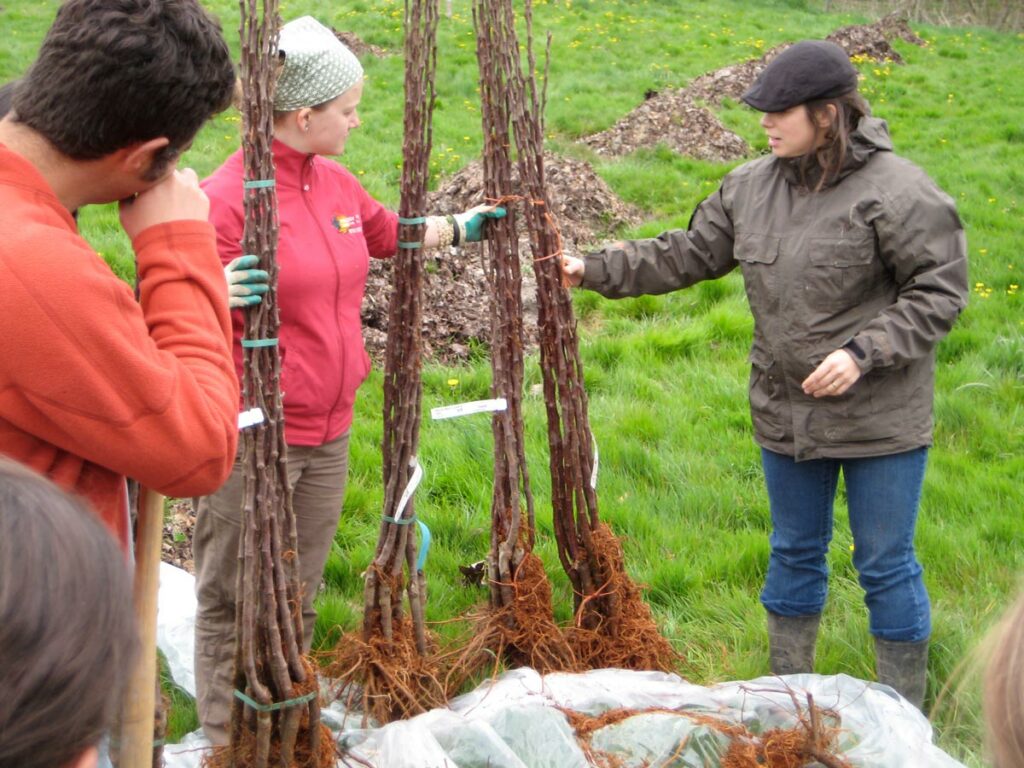
Potted Trees vs. Bare-Root Trees
I asked Susan if she would recommend buying potted trees or bare-root trees. She, without hesitation, said to purchase bare-root trees. Not only are they cheaper, but they're healthier.
Bare-root trees adapt better to a new environment because their roots aren't stuck in a pot getting root-bound. They haven't been spoiled by potting soil, so they tend to bounce back much faster.
When you get your bare-root tree, Susan says to prune off the top third of the tree the day you plant it in the ground. She says it will look very tiny, but what happens by pruning is that the energy goes into the root system instead of pushing out new branches.
My recommendation, if you can visit the nursery yourself, is to sift through the trees and choose the one with the biggest root ball. That tends to give me the best success with my trees.
When to Plant Fruit Trees
It's important to know the best time of year to grow fruit trees. This will depend on the climate where you live.
- Warmer Climates – For warmer climates, the best time of year to plant fruit trees is in the fall. Ideally, they go in the ground about October or November. Since warmer climates have mild winters, this is ideal. Summers tend to be extremely hot, so we don't want to burn the trees up. However, a few cold snaps shouldn't hurt the trees. If you plant in March or April, you may end up losing your fruit trees. They need ample time to develop a good root system before being exposed to extreme heat. So, by planting in the fall, they get about six extra months for root development. If you have no other option than to plant in the spring, be sure to water them deeply and often.
- Colder Climates – For cooler climates, the best time of year to plant fruit trees is in the late winter or early spring. Ideally, they go in the ground between March and May. Since cooler climates have more severe winters, you don't want to plant a fruit tree in the fall where it will be exposed to multiple freezing nights. However, because you'll be planting in the spring, it's imperative to make sure your fruit tree is watered well, especially through that first summer during the hotter, dryer months. Weekly deep waterings are great. This is also why creating a fruit tree guild can be a game-changer for your fruit trees. The mulch will help prevent evaporation from the water and the other plants will help feed the tree.
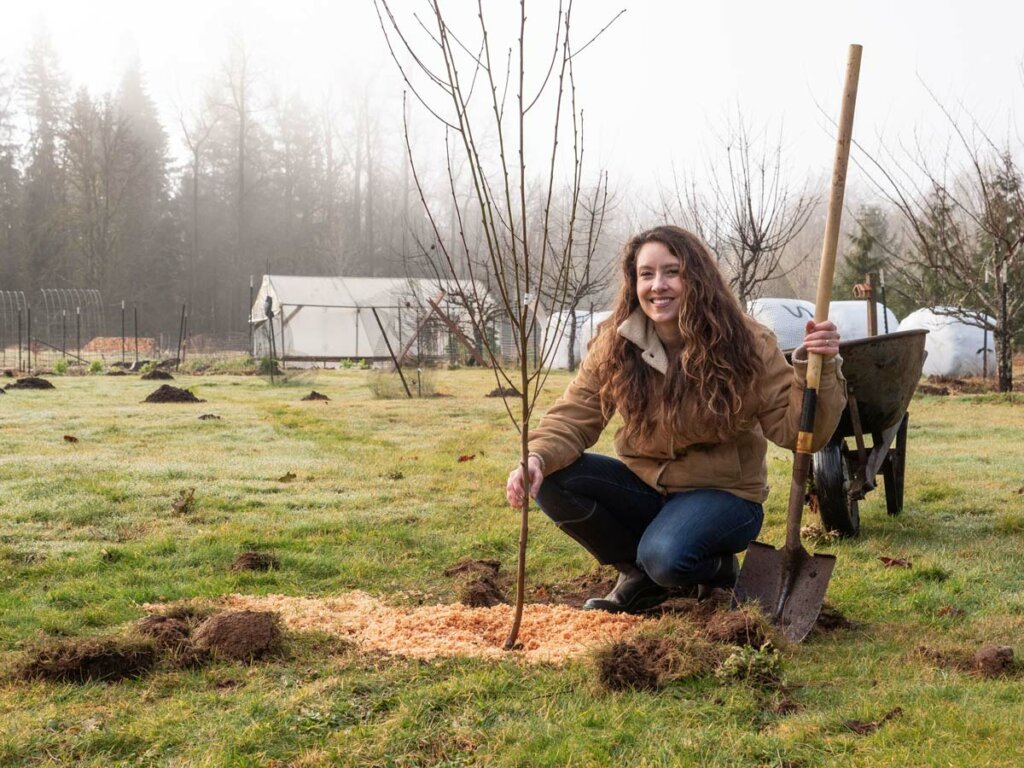
How to Plant Fruit Trees
Digging a Hole
If you plan on transplanting an established fruit tree or fruit plant or planting a bare root or potted tree, be sure you dig the planting hole twice as wide and twice as deep. Create a cone shape of dirt in the bottom of the hole and spread the roots out and down this dirt cone (same technique in How to Plant Strawberries)
Filling the Hole
Backfill the hole with loose dirt and a layer of compost. If any of the roots are broken, remove them before planting. Keep the level of dirt at the same level it was in at the nursery. You can usually see the line on the trunk of the tree or bush.
Create a mote around the base of the tree to allow the water to filter down onto the roots instead of running off into the surrounding soil or land.
Use a small amount of water when you plant the tree. The soil will settle, and you’ll be able to see where you need to add more dirt.
Watering Schedule
Don’t overwater in the winter months. In the late spring, when the tree leaves out, and the soil becomes dry, water deeply 5 to 10 gallons once a week.
Throughout the first few summers, you’ll want to water the plant once a week if you don’t have any rainfall. I neglected to do this with one of our new apple trees and lost it. So even in the rainy Pacific Northwest, you’ll still want to follow the rule of watering deeply once a week with a newly planted tree if there isn’t any moisture falling from the sky.
Note: It takes an average of seven years before you’ll be able to harvest a sizeable crop from your fruit trees. Most bare rootstock is a few years old, but you can ask the nursery for more specifics.
The bigger or older the stock, the more expensive it will be.
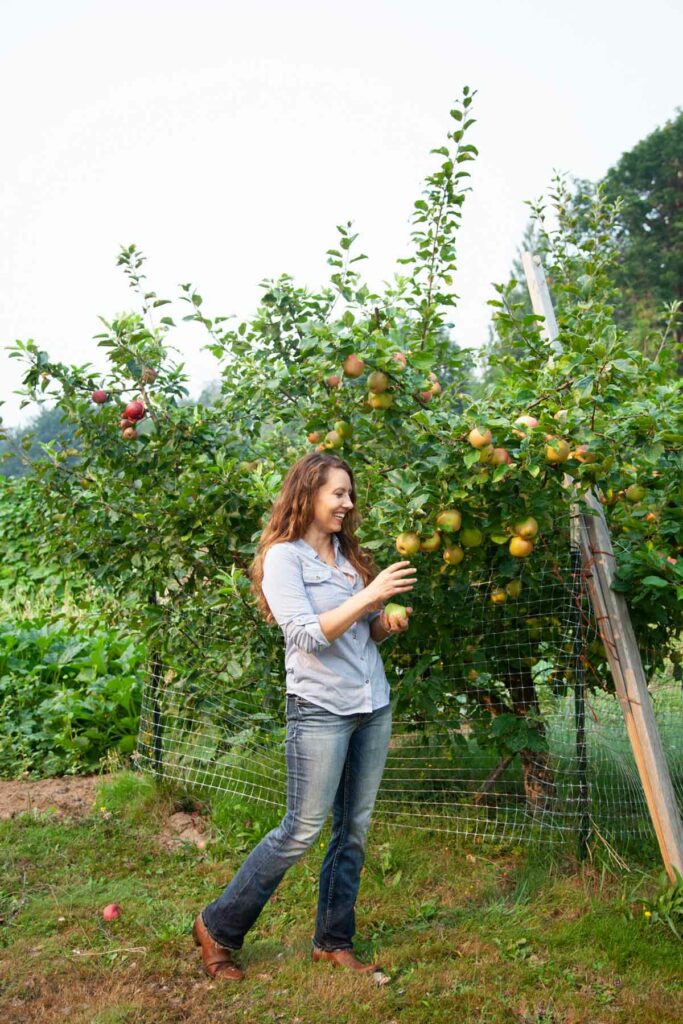
Types of Fruit Trees
When my husband and I first started planting our orchard, we were working with raw, undeveloped land. There were no other existing fruit trees around us. We planted bare-root fruit trees because they're a less expensive option. However, we didn't understand the difference between self-pollinating and cross-pollinating trees.
Self-Pollinating
Self-pollinating fruit trees are trees that can make fruit all by themselves. So you only need one. You can have more, but you don't have to have multiple trees in order to get fruit. It's really important to know for a small or urban homestead where you don't have a lot of acreage. It's nice to know you don't need multiple trees for fruit.
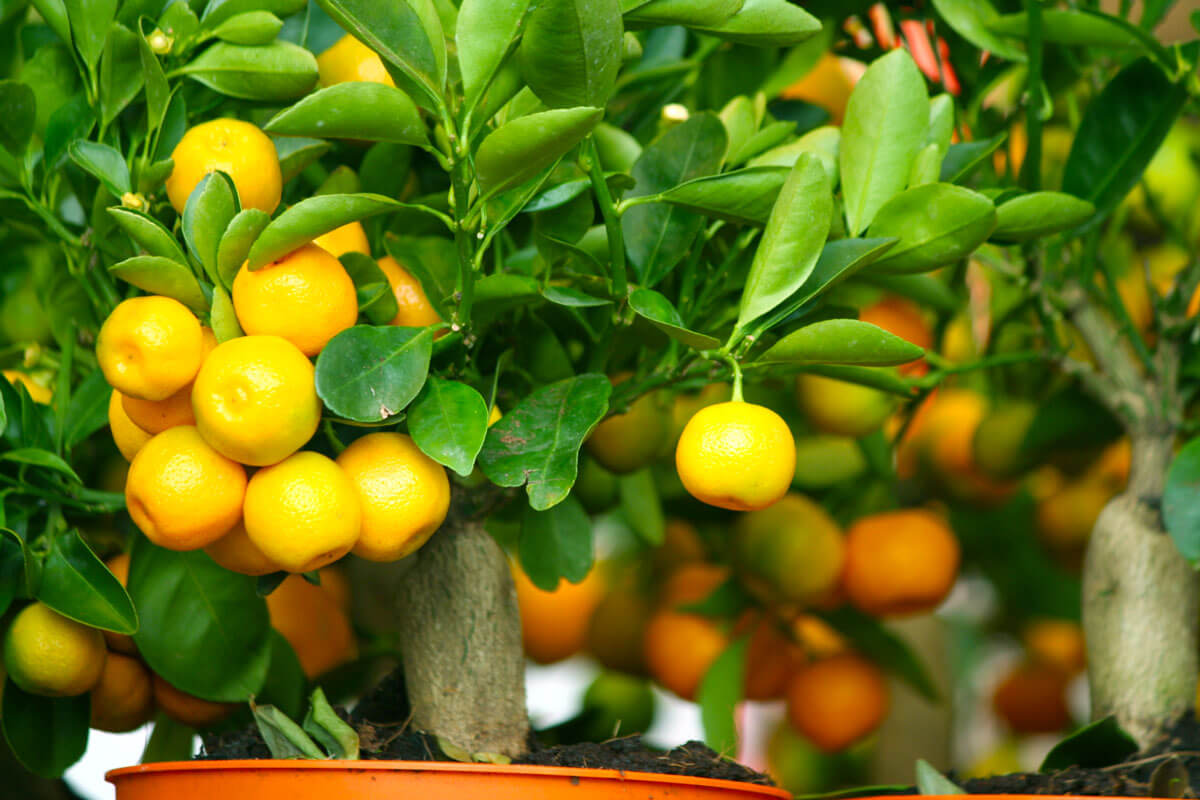
Self-Pollinating Fruit Tree Varieties
- Apricot
- Pomegranate
- Citrus Fruit
- Grapevines
- Persimmons
- Sour Cherries
- Berries*
- European Plums*
* Though berries and the European plum are on the list, they will do better if they have another variety to cross-pollinate with.
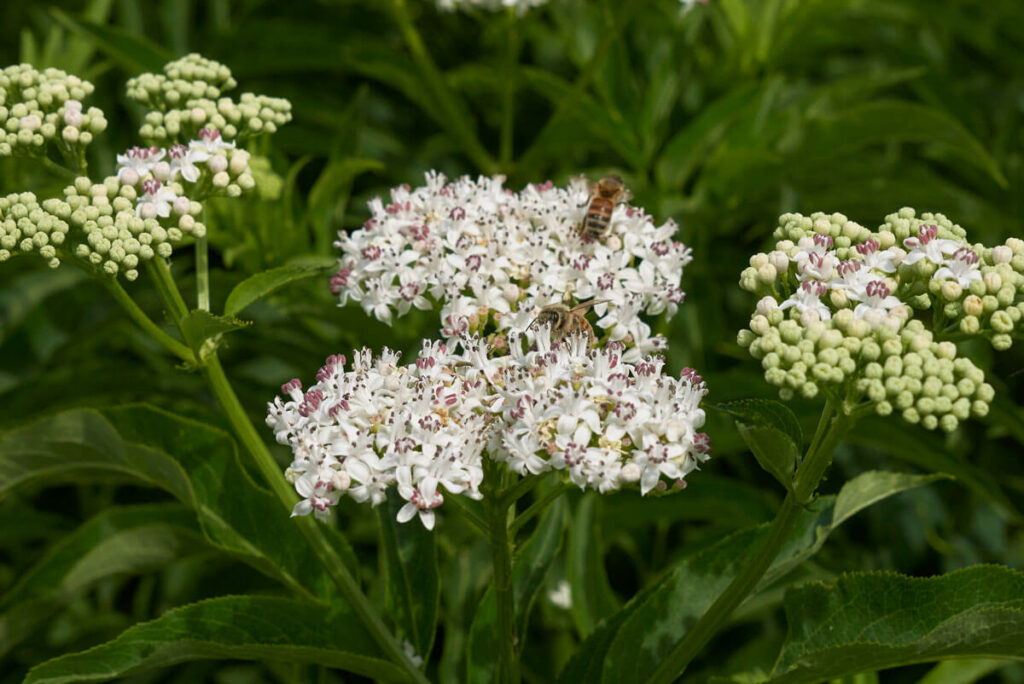
Cross-Pollinating
It's important to note that when you have a “cross-pollinating” tree, it means it needs more than one variety of trees for pollination, not more than one plant. If you plant two or more of the same variety, you won't get much fruit production.
Be sure your varieties have the same bloom time. In order for cross-pollination to happen, both trees need to be in bloom at the same time. For example, if you have early-blooming blueberries, you need another variety that blooms early for cross-pollination.
If you have a neighbor with a different variety of trees, you should be good to go; however, make sure they're within 50 feet of one another for cross-pollination to occur.
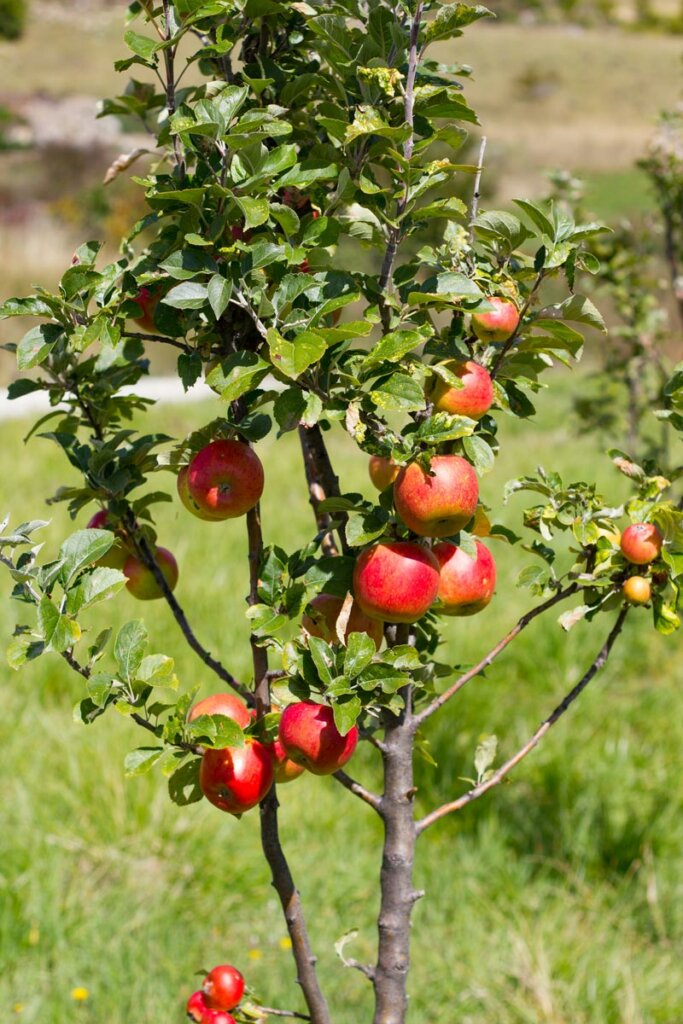
Cross-Pollinating Fruit Trees
- Apple (there are a few self-pollinating varieties like Golden Delicious, but they will still do better if they have a cross-pollinator)
- Pears
- Japanese Plums
- Sweet Cherries
- Most nut trees
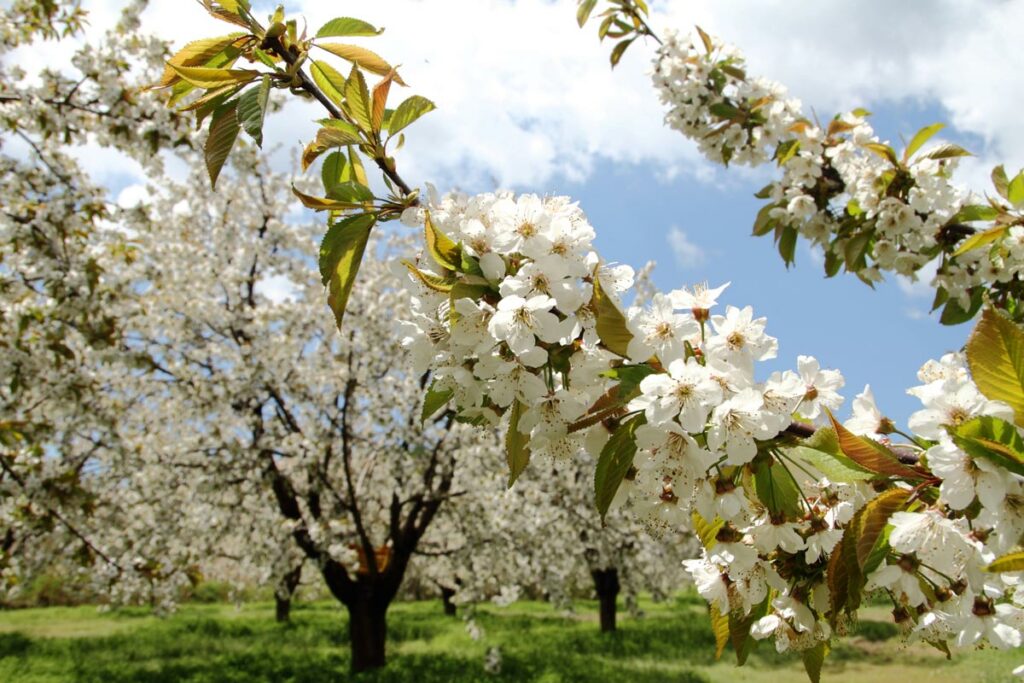
Early-Season, Mid-Season and Late-Season
You need to pay attention to early-season, mid-season, and late-season on your fruit trees. A crab apple is sour and not good for table eating, but it's a super pollinator because it has a very long bloom time and cross-pollinates with almost every type of apple variety.
We got a crab apple tree for that very reason! The crab apple is also an excellent source of natural pectin, so it's a great fruit to mix into homemade jams and jellies.
Root Stalk
There's one more aspect of fruit trees you must be aware of. Fruit trees can grow to varying sizes. If you're hoping for a dwarf variety, you need to be sure that it's a dwarf root stalk. You don't want to purchase an apple tree, thinking it will grow to a certain size, then have that tree take over your entire yard because it was grafted onto a full-size root stalk.
If you're not sure, it's always smart to ask.
Chill Hours
Chill hours are hours during the year when the temperature is generally below 45 degrees on average in a region. Certain trees need a specific number of chill hours. If your fruit trees don't get the required amount of chill hours, there will be little to no fruit production.
You may be able to determine this by your hardiness zone. This is one reason I recommend purchasing your fruit trees from a local nursery as they're familiar with the climate, chill hours and zones in your region.
Knowing how many chill hours you have in your area and how many chill hours the specific variety of trees needs is important. Reach out to your local extension office or consult with a professional horticulturist to make sure you get plants that are going to work for you and your area.
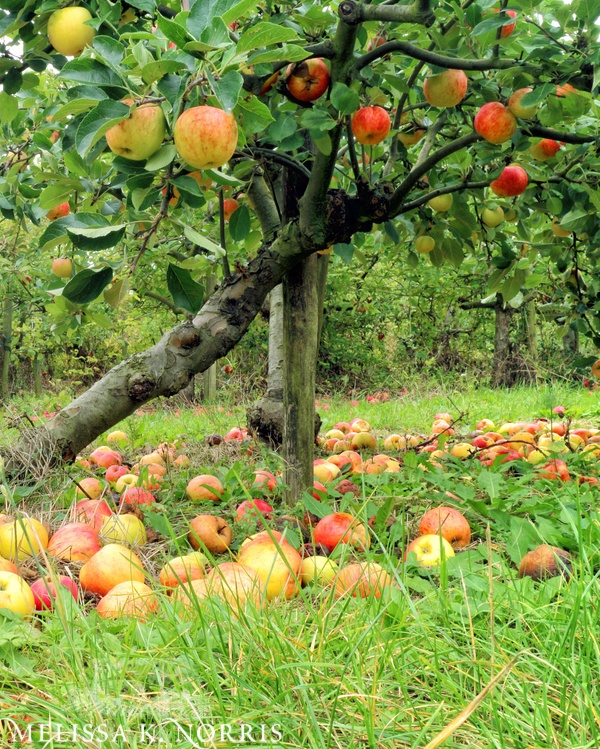
Fruit Trees
Now that we have our quantities explained, let's dive into how many fruit trees are needed, per person, to grow a year's worth of food?
NOTE: The following averages are for one mature fruit tree for each type of fruit listed. Trees that aren't mature will yield a lower harvest.
Apple
- Dwarf: 5 to 6 bushels
- Semi-Dwarf: 10 to 15 bushels
- Standard: Anywhere from 5 to 20 bushels
Apricot
- Dwarf: 1 to 2 pecks
- Semi-Dwarf: 1 to 2 bushels
- Standard: 3 to 4 bushels
Cherry, Sweet
- Dwarf: 8 to 10 gallons
- Semi-Dwarf: 10 to 15 gallons
- Standard: 15 to 20 gallons
Cherry, Sour (aka Tart or Pie Cherry)
- Dwarf: 3 to 5 gallons
- Semi-Dwarf: 12 to 18 gallons
Nectarines
- Miniature: 1 to 2 pecks
- Dwarf: 3 to 4 bushels
- Standard: 6 to 10 bushels
Peach
- Miniature: 1 to 2 pecks
- Dwarf: 3 to 4 bushels
- Standard: 6 to 10 bushels
Pears
- Dwarf: 6 to 8 bushels
- Standard: 12 to 15 bushels
Plum, European
- Dwarf: 1 to 1 ½ bushels
- Standard: 1 to 2 bushels
Plum, Japanese
- Dwarf: 3 to 4 bushels
- Semi-Dwarf: 4 to 5 bushels
- Standard: 5 to 6 bushels
In reviewing these, you can really tell that based on the type of tree the actual production can vary greatly. For example, the difference between the dwarf and standard apple tree is a big difference, from six bushels for the dwarf to 20 bushels for the standard. But when you look at the Japanese plum the difference is really only two to three bushels difference.
What you need to do now is calculate how many bushels your family will consume of each variety of fruit.
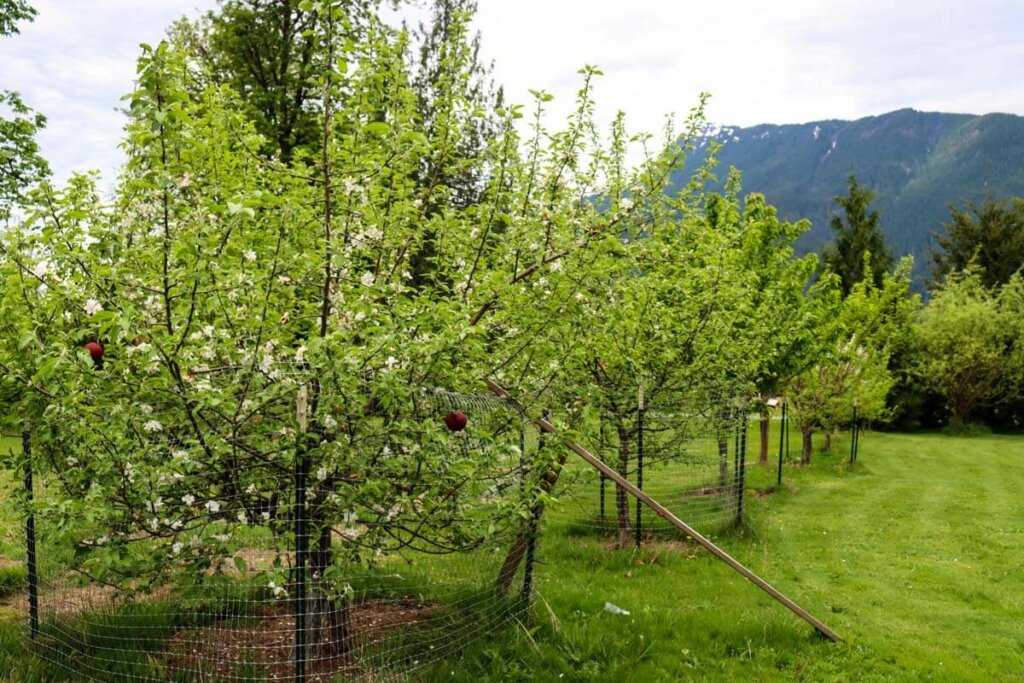
Tips for Getting Fruit Trees to Grow Fast
When planting new fruit trees, we're all very excited for the tree to begin producing fruit. That's the whole point, after all, right?
However, your tree will be better off if you follow these simple tips when planting a new fruit tree, and you'll end up with a healthier tree, faster fruit production and more to harvest:
- If you want fruit trees that will produce fruit faster, choose stone fruits. They are much faster than pear or apple trees in regards to production.
- When choosing fruit trees from a catalog, look for the words “vigorous” and “precocious.” Vigorous tells you that the tree is fast-growing, and precocious tells you that the tree will produce a harvest sooner. A precocious tree will give you fruit in the second or third year, whereas one that's not precocious may make you wait until year four.
- Purchase bare-root trees from a specialist fruit tree nursery (avoid buying from big box garden centers).
- Soak the tree in a bucket of water for up to 30 minutes before planting. That will help the tree get nice and hydrated before planting into the ground. Though the tree will likely be in dormancy at the time of planting, it still needs water!
- Do a soil test prior to planting and amend the soil with fertilizer (the ideal fertilizer or soil amendments should come with the growing guide for the tree).
- Know the best location for planting your tree. Does it need full sun, partial sun, etc. Also, consider the size of the tree at full growth. You don't want it shading out your vegetable garden once it's full grown and leafed out.
- Make sure the graft root is above the soil line and avoid any air pockets from remaining in the soil (this can cause air pruning of the roots which will slow down growth).
- Plant the tree right away and prune the “whip” (the top 1/3 of the tree) the day you plant it. Pruning fruit trees always seems counterproductive, but trust me on this one!
- Water the trees properly. Fruit trees want deep watering that gets down to the roots. Overhead watering or using a sprinkler that gets the foliage of the tree wet can lead to disease.
- Don't allow the tree to fruit the first year. Allow them to blossom (to help the pollinators), then pinch the blossoms off so they don't produce fruit. This will help establish a strong root system for the fruit tree.
- Prune them heavily the first few years to establish the roots and the tree's shape. This also promotes good air circulation and a strong canopy where every branch gets access to equal amounts of sunlight.
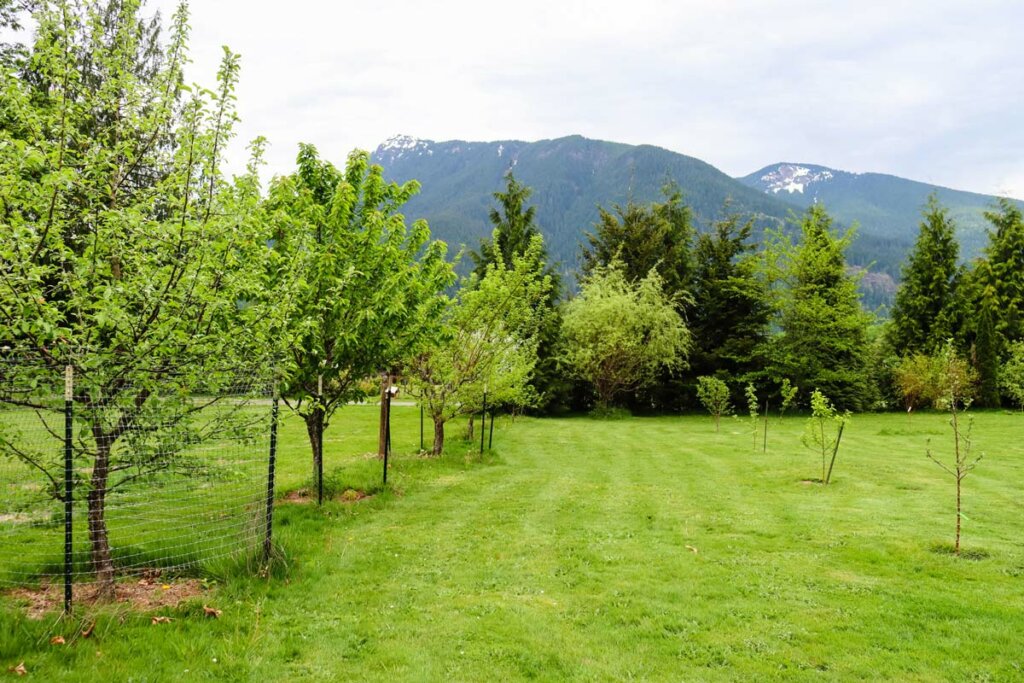
Fruit Tree Growing Mistakes to Avoid
- Not planting a bare-root tree right away. Even letting the tree sit out in the sun for an hour or two can cause the blossoms to open up and the roots to dry out and die. If you can't plant it right away, put it in a cool, dark, damp place (ideally in soil) until you can plant it.
- Don't plant them too deep! Most fruit trees are grafted. There is a graft union where the top part of the tree is grafted to the root stalk. If you bury the graft union, you can get a full-sized tree when it was meant to be a dwarf tree. The graft union can actually grow roots above the union. You can even get rot on the graft union. So, be sure to keep the graft union above the soil line.
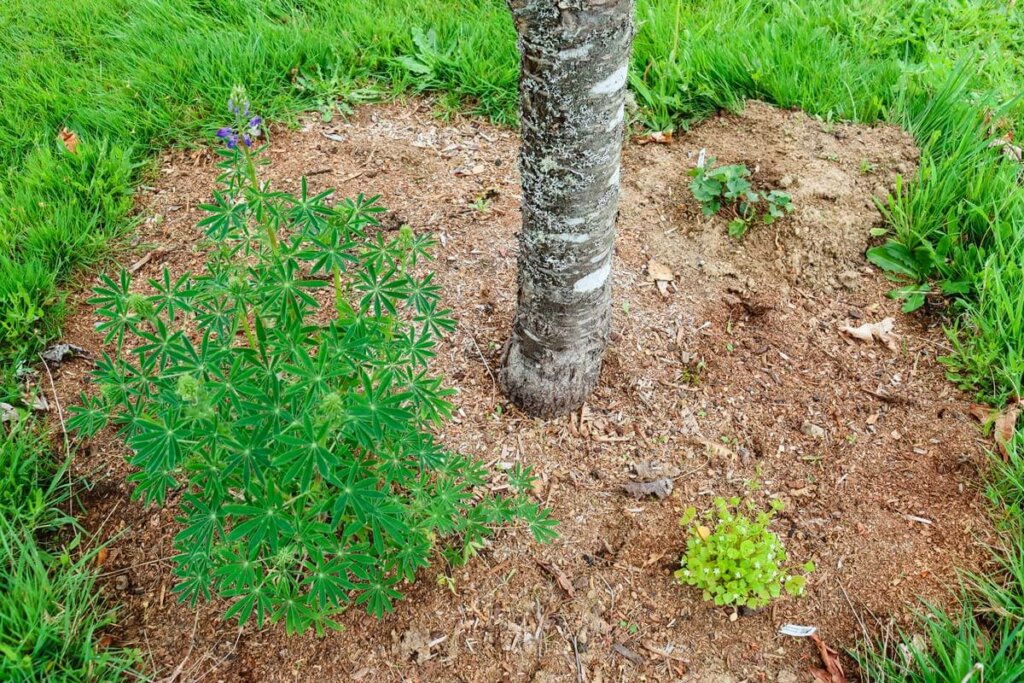
Soil Type & Fertilizer
Thankfully, fruit trees are not as picky when it comes to soil as, say, berry bushes or vegetables. You don't want to give your fruit tree anything before you know what it needs. You won't know what your tree needs until you test your soil.
If there are any major nutrients lacking, then you can amend the soil within the first year. Also, check the pH of the soil to make sure it's around the right pH for your fruit tree variety.
Every year, before the buds break in the springtime, it's the best time to add some compost and mulch to the base of the tree.
The tree has enough energy stored in the root system for branch growth and fruit production, but once those nutrients are used up, they need to be replenished. We do this by adding a two-inch layer of compost at the base of the tree spreading out to the edge of the canopy. It doesn't matter how old your tree is. The feeder roots are at the edge of the tree around the drip line.
Avoid nutrient spikes with synthetic fertilizers for your tree. These are not healthy for the tree or the environment.

Damaged, Diseased or Struggling Trees
Don't dispair if you have a fruit tree that's struggling. Susan says there is a lot you can do to rehabilitate a tree and bring it back to its full fruit-producing glory.
- At the correct time of year, start with a good pruning to open up the canopy, removing no more than 25% of the tree in one year.
- If your tree has a disease, you want to try and remove the diseased, dead or dying branches by pruning.
- If your tree has a different disease, there may be other methods for fixing the problem.
- Knowing the seven different fruit tree diseases will take you very far in protecting your trees. I'm hoping to have Susan back on the podcast to dive deeper into this topic, so stay tuned for that.
For now, to learn more, grab a copy of Susan's book Grow Fruit Trees Fast. It will take you about an hour to read and you'll learn so much about growing fruit trees for your home garden.
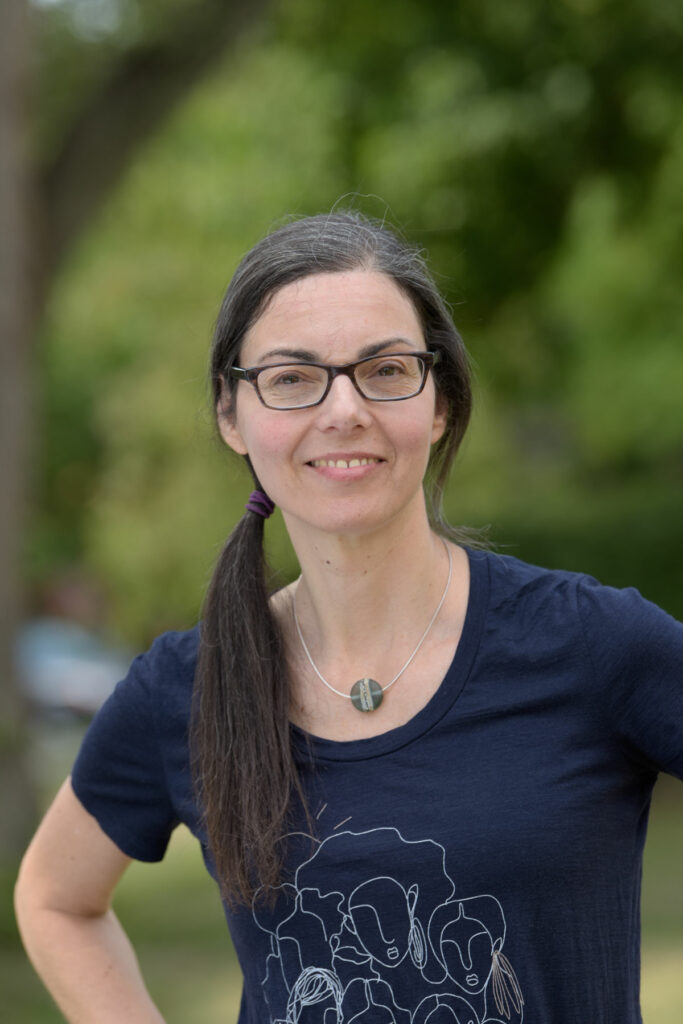
Where to Find Susan Poizner
You can find Susan on her website, Orchard People. While you're there, be sure to check out her course on fruit tree care (coupon code “MELISSA” should be automatically applied for a discount). She also has a radio show and podcast, Orchard People, and find her books at the links below:
You can also find Susan on Facebook and YouTube.
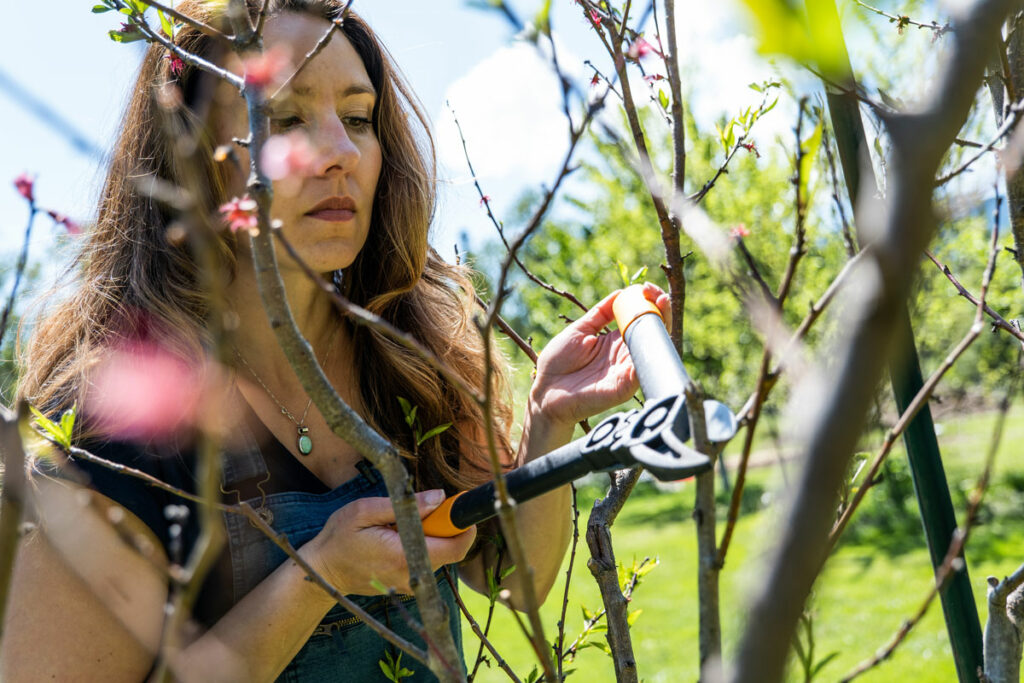
Now that you know how to grow fruit trees in your garden, whether you're a beginner, planting a young tree or a mature tree, you should be armed with the knowledge needed for ample fruit production for years to come.
More Posts on Growing Fruit Trees
- When to Plant Fruit Trees in an Orchard
- How to Care for Fruit Trees in the Fall and Winter
- How to Treat Fruit Trees Organically for Pest Control
- Utilizing Fruit Tree Guilds
- How Many Berry Bushes and Fruit Trees You Need to Plant Per Person
- How to Prune an Apple Tree in Winter
- 5 Tips to Starting an Orchard and Growing Fruit
- Growing Fruit Trees in Pots
Melissa: Hey pioneers, welcome to episode number 424. Today's episode, we are going to be talking about growing fast fruit trees, which may sound a bit like an oxymoron. If you have ever delved into the world of growing fruit trees, then you know that it can sometimes take up to seven years of a fruit tree growing before you ever get a fruit harvest or should allow a fruit harvest to come off of your fruit trees. I'm very excited for today's episode because having your own orchard, and that could mean a couple of different types of fruit trees, or maybe it's even just one or two fruit trees, and maybe it's many, many more than that. But I feel like in the home production world of homesteading where we talk about raising livestock and definitely doing a vegetable garden, fruit trees and berry bushes tend to be something that's a bit more overlooked.
And I think a lot of times people think you have to have a really large area in order to grow any type of a fruit tree, and though you do have to have some space, not nearly as much space as a lot of people think. And today's guest is even going to help you come up with ideas on how you may be able to grow fruit trees even if you live in a more urban environment or suburban environment, an area where you don't have a lot of land. And so I'm really excited for today's guest. Plus she shares a lot of knowledge on helping you select the right type of fruit tree and how to get the foundation set for it so that it grows fast and will produce for you a lot of fruit for many, many years to come.
Today's guest is Susan Poizner. She is an urban orchardist and fruit tree care educator from Toronto, Canada. She's the founder of the award-winning website, orchardpeople.com, as well as the author of Growing Urban Orchards, Grow Fruit Trees Fast, and Fruit Tree Grafting for Everyone. You may recognize Susan as the host of the Orchard People Podcast, where she shares insights on organic fruit tree care, food forests and permaculture. And her goal is to simply empower everyone to successfully grow fruit trees. She is an ISA Certified Arborist and travels across North America as a keynote speaker teaching gardeners, arborists and home growers how to grow fruit trees that thrive. So I am very excited to have Susan on today's podcast episode. So without further ado, let's get to it. Well, hello Susan and welcome to the Pioneering Today Podcast.
Susan: I am so happy to be here. Thank you for inviting me.
Melissa: Yes, I am really excited. I had the privilege of being on your podcast. It's actually been a while. And we were talking when we were off-air and I started picking your brain about fruit trees and I was like, "I have to have you on the podcast. You've got so much knowledge and things that I want to do with our fruit trees." I'm like, "I might as well." This is what I love. I'm like, "I might as well bring you on because I know if I'm wanting to learn these things from you, then surely other people are too." So I have been waiting for this episode, I have to tell you, and I wanted to make sure that you and I got a chance to talk in plenty of time for both myself and listeners to put some of your tips and stuff in action for this year.
So thank you for coming on. And I wanted to start us off first with we're talking about growing fruit trees faster because I know everybody, when you plant fruit trees or berry plants or anything like that perennial wise, you're not going to get fruit the first year and you're like, "Oh man, I have to wait so many years depending on variety, et cetera." And so the idea of being able to grow them faster to get to harvest faster is very intriguing, but also setting the expectation, are you really going to get fruit faster or are you just going to produce a healthier tree so that it will be more long-lived and give you a larger harvest when it comes time for it to produce fruit?
Susan: Well, the great thing is you can have both of those things, Melissa. You can have everything. You can have fruit faster and healthier trees, but here's what happens and here's why. Through my whole journey with fruit tree care, I made so many mistakes that wasted a lot of time that made it very slow. So for instance, you buy the wrong trees, you buy trees that either don't survive in your climate or don't cross pollinate properly or just are harder to grow and then three years later, four years later, you think, "Oh no, I've got this tree. It's not producing." And so I guess what I would say as a warmup is the thing I wish I knew 14 years ago when I started is take a little time, just a little bit of time and do some research and make a plan.
And that way you know you're getting the right tree, you know you're taking care of it properly from the very day you plant it, you're pruning it properly from really early on and sculpting the kind of tree that will be healthy and productive and support a heavy harvest. And you're doing it all right all from the start. So that's one of the ways you can speed up production, not wasting time like I did making mistakes. But there are other things you can keep in mind too, and we can talk about them. Some fruit trees do produce quicker. And for instance, apple trees can be slow, but there are some cultivars that are fast and you just need to know what they are.
Melissa: I love this. I have to say this year I had originally planted way back in the day, and I know we're going to cover this about why it matters where you purchased your fruit trees and some other things along those lines, but I had two of my plum trees that we had put in over 15 years ago and I had to take them out. The disease was so bad in them and it was like one of those like you're saying, that ounce of prevention, if I had purchased the varieties that were resistant to the disease to begin with, and I'm like, "Oh my gosh, 15 years just gone." It's part of the fruit trees.
Susan: I hear you. Oh my gosh.
Melissa: So anyway, so I'm really excited that we're having this conversation because it's what, like you said, it's looking back and I'm like, had I known what I know now 15 years ago when I first put them in, I could have avoided taking out 15-year-old trees because they were just so far diseased, had I known what I needed to know in the beginning. So I guess first off, starting a little bit at the beginning of your story is how did you get into teaching about orchards and specifically, which is one of the reasons that I really was excited to have you on is you teach from a very natural approach. Because we have kind of commercial growing and then you've got organic and then you have natural. A lot of times organic and natural can go together. But that was one of the reasons I was really excited to hear your approach when you and I were talking earlier. But I'm curious what your journey has been and how you got into this.
Susan: Oh, you talk about the natural approach. I had to be as natural as possible and here's why. So my background is totally something else. I was a journalist, I was a filmmaker, I did all sorts of things. I traveled around the world, had a very interesting life. That's great. Came back to Toronto where I was born and got interested in gardening, fell in love with trees and fell in love with fruit trees because I loved growing veggies. And I'm like, "Why waste my time growing zucchinis when I can grow an apple or cherry tree?" And oh my gosh, get harvest year after year and it's so easy, right? Right? It's so easy?
Melissa: It's so easy.
Susan: Exactly. But the thing is we don't have a huge backyard. And so we had a park nearby that was pretty empty and neglected and I thought, "Wait a minute, they have community gardens. Why couldn't we have maybe a community orchard and plant lots of trees there?" So that was my approach. And I went to the city and I found some friends to do this with and I said, "Hey, can we work on this park and do something?" And the park supervisor was lovely and he said, "Susan, what would you like? Would you like an annual bed or whatever?" I'm like, "I want fruit trees." And I thought he was going to say, "Oh, no, no, no, no. Too much work." Luckily this amazing park supervisor loved fruit trees and he's like, "I love fruit trees."
He was from Trinidad I think or somewhere like that and he's like, "I grew up with the fruit trees. Let's do this." And we had to work together. And I was thinking about this today how in the beginning my whole priority was, "Okay, how do I make this a project for a park? How do I get people involved? How do I get the learning out to the community?" The last thing on my mind was how to take care of these trees so that they'll be healthy and productive. It didn't really occur to me that it was going to be difficult. And so to answer your question, I started this project, I planted the trees in the ground and had no idea what I was doing. What I did know was we were limited. We were not allowed to spray toxic sprays in the park where children are playing and whatever, so forget it.
You can't do that in a public space, and I didn't want to anyways. But when the problem started to happen, the disease you talk about, the issues of poor production and even sitting around looking at the trees and thinking these trees are not growing very quickly. Somebody on the outside might say, "Well, they just need nitrogen, pump them up with some nitrogen." And it turns out that they don't need nitrogen, they need pruning at the correct time of year. They need hands-on care, they need irrigation. So I learned all of these things simply by making mistakes.
And my natural perspective comes from the one thing I needed to learn myself and then to teach the volunteers in my group, what is the minimum that I need to do in order to keep these fruit trees healthy and productive? I have a job, I have things I need to do. I can't spend all my time spraying these trees or doing whatever. And it's a park. I'm limited. What do I need to do? So that's where it all began.
Melissa: Okay. I love that part of the story where you immediately went in. Because one of the things, I'm sure you probably can relate to this is having the privilege to share a lot of things that we have learned the hard way to save people the mistakes in growing, for me, in homesteading with livestock, not just plants, but both of that. And having the digital world where we get to help people who aren't even in our local community as well as you have shared that you did, as well as helping people in our local community. But I think one of the things that I find probably most frustrating is when you are sharing and you'll get people... And no matter what you do in life, I'm sure everybody runs into this, which I know to them they feel are very valid, but excuses as to why they can't do it rather than looking for a solution that they could do it.
They get so focused and fixated on, "I can't do this because I don't have enough space to grow an orchard," or, "I don't have enough space to grow fruit trees." You can insert whatever in there. And honestly, if that's what you think, then that is what the truth is going to be. But instead, if you look and like, "Okay, I don't have a very big backyard, but there is a park near me," and taking that initiative and going and doing that and being able to involve other people, that makes my heart so happy. We need more people to take that initiative in the world and in their spaces. So I am so happy that you did that.
Susan: Thank you so much. And also there was so much benefit from this whole experience that is more than just fruit at the end of the journey. And that's part of my whole adventure and my whole journey has been to see that these fruit trees aren't even just about fruit, right? They are about community building, they're about learning. They're about children walking through a park and for the first time in their lives seeing that cherries grow on trees. They're about cherry harvest day where a dad takes his kid, little girl, and puts her on his shoulders so she can reach a cherry. They are about people of all different ages coming together in a public space where you don't have to pay to get in, you don't have to buy a coffee, you just come. You are always welcome in that park. And it is fruitful and beautiful and blossom filled and filled with insects, beneficial insects.
A lot of the fears, and there were a lot of fears when we started this project. We're around, "Oh, the fruit is going to attract wasps and that'll be terrible, and my children will be bitten and they'll get cherry stains on their T-shirts. It's going to be horrible." Right? And in the end, even the critics come up to me and say, "Thank you. Thank you so much for doing this project." Now it took 10 years, but we've all learned so much from this project. There's heartbreak too. It's a public space. We are waiting for our apples to ripen and people come and harvest them before they're ripe. And people fill whole bags. They don't just take one or two, they take the whole tree. There's people who come and harvest our beautiful plum trees filled with plums, but they harvest the plums while they're green. There's a certain sort of recipe for unripe plums that's a cultural thing.
And we kind of caught them and we said, "Hey, you're welcome to take a handful, but first of all, they're not ripe. And second of all, if you take them all, there's none left for the children and the people in the park, there's none left for anybody else." And they say, "Oh, you don't understand. In our culture, this is a very important dish and buying these green plums is very expensive." And I'm like, "Yeah, I get that. I get it. But it doesn't mean that you need to take all the plums on our tree." So there's so much more than just the fruit at the end of the journey. And it's been great.
Melissa: And it's funny because when you first get into gardening, be it vegetable gardening, flower gardening, really any type of gardening of growing plants, I think for most folks they get into it with the idea of I'm going to get this harvest, be it beautiful cut flowers, if it's a cut flower garden or herbs or vegetables, fruit, whatever it might be. But if you stick with it, you quickly realize how many life lessons you actually learn via gardening. And I would say probably only half of them are actually related to making mistakes with the care of the plant, et cetera. To your point, there's so many more lessons, for me anyhow and for you, and probably most of the people who are listening to this, if they've gardened for any length of time, so many different life lessons that I get from gardening that goes way beyond just the harvest at the end of the season.
So with that, if you're not convinced to try growing some of your own food, I'm not sure that we could paint any better picture for you to convince you. But I want to bring it back to, does it matter where you purchase your fruit trees? Because fruit trees do take longer to grow and then to obviously produce food, unlike annual vegetables where you plant your seed and you're going to get a harvest provided you don't kill it within that one season. With the fruit trees, I feel like if you make a mistake early on, sometimes that mistake isn't evident until some years down the road in certain instances. So the very first part of purchasing our fruit trees, what's your advice there?
Susan: Yay. Great question. So glad you asked it because that is what it all revolves around. Here's what it doesn't involve, thinking, "Gee, I'd like to plant a fruit tree. You know, I like Honeycrisp apples. I'm going to go to the garden center and pick up a Honeycrisp apple tree. And you know, they're so expensive in the stores and I'll just buy them and make them, grow it in my backyard." Well, the problem with that approach is there are so many problems with that approach. First of all, Honeycrisp apples are amongst the hardest apples to grow, and they've got so many fussy problems, they can take a lot of time to produce. But the worst thing is that these commercial apples are designed to be grown with pesticides and fungicides that we do not want to use in our backyard. So when you are shopping around for an apple, you've got to think, where can I buy an apple tree that is easier to grow?
So take out of your mind all the Honeycrisp, Macintosh, Golden Delicious, everything from the supermarket, let's put aside. Let somebody else grow those. Those are hard to grow. And they're popular for supermarkets because they're really hard and they don't get messed up in packaging, so they're easy to ship and they last a long time. They got lots of benefits, there's a place for them. Instead, we want to choose really delicious flavorful fruit, maybe cultivars people haven't heard of, but that are easier to grow. And a lot of these cultivars will be disease resistant. So Melissa, you had some problems with your plum trees and you said, "Had I known that there were disease resistant varieties, I would've gone for those." So I would say in terms of where you buy your fruit trees, forget the garden center, forget the big box store and hone in on specialist fruit tree nurseries.
They have a wide variety of cultivars. You can have so much fun reading those catalogs, learning about the flavors of each cultivar, learning about the harvest time. So you can have, let's say you have room for three trees in your backyard. Let's say you have a cherry that ripens in July and a plum that ripens in August and an apple that ripens in September. You can plan it so you have fruit throughout the growing season. So that's amazing. You can choose varieties that are resistant to the types of diseases that you get in your community, and every community will have some different ones. So I would suggest fruit tree nurseries are the way to go. They all have amazing catalogs. That's where you're going to start your research.
Melissa: Now, because I have ordered some replacements for my plum trees, but to your point, I started reading through all of the descriptions as to what was disease resistant as well as to your point of when they would come on and be ripening, how many years it would take them to producing a large harvest. There's so many different factors there. And I have to say it's really fun. I geeked out. I had this little spreadsheet where I was putting down, "Okay, this one meets this requirement, this one meets that." And so I will also say, if you can find, now you may not be able to, but for me, if I can find some of these that are regional where they're actually growing the varieties in a climate that's similar to mine. So obviously if you can find a regional grower who's actually cultivating and growing the stock, not just...
So I don't know about your experience Susan, but mine is I find a lot of the big box garden stores, they usually are just being shipped in from all areas of the country because they're usually large chains. They're not growing the stock first off, they're just buying it wholesale from someone else and then retailing it. But secondly, a lot of the stock is just getting shipped from all over. It's not really picked to be designated by region. And so that can pose some problems. But when you're buying your trees, because there's always the option of doing potted versus bare root, and usually potted is more expensive. So a lot of folks will go bare root just because it can end up saving some dollars upfront, but is potted better than bare root or vice versa?
Susan: Okay, so the interesting thing you've identified, so potted trees are more expensive and they're worse. And bare root trees are cheaper and they're way better. Okay, so fruit tree nurseries, the local ones, and on my website, orchardpeople.com, I have an article where to buy fruit trees or something. And it's got a list of fruit tree nurseries across North America. So you can go and scroll and have a look at, find a nursery near you. So at that nursery, they will be growing things that are hopefully in your climate zone, good for your climate, unique trees that maybe are even sort of culturally appropriate, things that were grown in your area a hundred years ago, that kind of thing and have always survived there. So these nurseries will distribute trees that are bare root, which means that you get them in the dormant season, they ship these trees in a box, no soil on the roots.
The roots are wrapped up with damp, moist newspaper or something. You get them, you have to plant them right away. But here's the thing, bare root trees adapt better to a new environment because their little roots aren't stuck in a pot circling around in circles, crowded in there, stressed out from living in a pot far too long. These trees were out in nature and they were dug up. So some of their roots might be a little bit damaged, and that's a little stress for them. But then they go into your soil. They're not spoiled by this potted pot soil. And here's the thing, you plant a bare root tree and the correct way to plant it is to plant it correctly, but to prune it on the day you plant your tree. So you actually snip off the top third of that little tree. And it's little, it's going to look really little. And you're thinking, "Wow, I want a fast harvest."
My book is called Grow Fruit Trees Fast. Why would Susan suggest I buy a little bare root tree and then make it even smaller with a pruning cut? That makes no sense. But what happens is the energy that is in the roots of the tree, there's a limited amount of energy. And instead of putting it out to the little branches that are left or every bud on the tree, it has fewer buds. So it pushes that energy into that little whip. It's called a whip. And it starts pushing out branches and it grows so fast and it also invests energy in its root system. So it's not wasting time making more little branches when it already has them. It's really good to start off your structure that way in terms of that whip. Planting a bare root tree starting with a whip cut and then you're going like gangbusters after that.
Melissa: Yeah, and you know what's funny is we do have one local nursery, and so when I'm getting bare root trees, they have them just there like shoot in. So you can easily pull them up and I will go through and I'll pull several up because I want the one that has the largest root mass. I don't care so much about what's on top, to your point. And so if you are able to go in person to a local nursery and look at the bare root fruit trees, that's how I select mine is I look at what has the actual biggest, largest root system on it. And if you don't prune your whip, oftentimes those branches will die anyways. At least in my experience. I've had some bare root fruit trees before I realized that you should prune them back and I didn't.
And I probably lost over half of those branches that I was so excited about by the end of the season anyways, and then had to prune them back. If had I done it just from the beginning, the tree would've been better off overall. So I feel like if you really pay attention, the tree does try to tell you like, "Hey, this is what you should have done in the first place," kind of following the signs, but doing it from the get-go will just save you all of that stress that the tree was trying to keep them alive and just couldn't do it.
Susan: It's the saddest thing to see somebody planted, whether it's a potted tree or a bare root tree that hasn't been pruned and they're so excited about all these branches. And the other mistake people make is they let their tree fruit early on because they're so excited to taste, "Well, what is it going to taste like? This is my fruit." The problem is the first year or two, the tree really needs to invest its energy into expanding that root system, stabilizing, getting in the soil and stabilizing itself in its new environment. And if you're forcing your tree to pump out fruit for you, that's energy that it's not putting into its own being. And so it gets weaker and weaker. So I have a picture that I sometimes show people, and it's a young tree and it's got these long floppy branches weighed down with fruit. It looks like the saddest thing ever.
And she said, "Susan, do you think it's time to prune this tree yet?" And I'm like, "Oh my gosh, it was time to prune the tree when you planted it." Now if it was a potted tree, you do have to wait an extra year because they're older, and there's various rules about that, but it's so sad to see it. To me, I feel like it's torturing the tree. This young tree needs to grow big and strong before it can produce a harvest for us. So we need to be kind to it and let it establish itself, let it be big and strong, and it'll say thank you by giving us harvest for years and years to come.
Melissa: Yeah, I agree. That's one of the first things that I share as well. Even with your blueberry plants, bushes, which are different than fruit trees, berries, but same thing. Pinch those blossoms up, I let them blossom because they're beautiful and the bees need the pollen in the spring at their early blossoms, et cetera. But then go through and remove them. Don't let them actually form into fruit even if they try those first few years. So speaking of blossoming, we've talked about this a little bit, but when you're considering purchasing your fruit tree, so getting them from that local nursery, going for bare root when possible. But what are some other things that people need to consider or do some research on? And I know we're going to talk about pollination, but kind of in that vein.
Susan: Well, pollination is such an important one, and you were talking about how fun it is to look at the fruit tree nursery catalog. I teach a class and it's a two-hour class just on how to choose a fruit tree because it's like a jigsaw puzzle. You get one thing right, "Okay, I chose the disease resistant tree, great, I'm doing great." But then you don't realize it needs a partner plant in order to produce fruit. So you can have this apple tree that's disease resistant, it'll be beautiful and it'll be resistant to diseases. It just won't produce any apples. So I've had people come up to me and say, "I can't figure it out. I have had two plum trees in my backyard for seven years. I've never had fruit." And it turns out they're totally different. They're not compatible as partners, and in fact, they don't even flower at the same time.
So how can they cross pollinate each other? You would need little time traveling bees to go from one tree to get the pollen and then go back in time to the other tree that already finished flowering. So cross pollination is another thing you need to consider. Another thing is what rootstock is it grafted onto? So you might have a small backyard, and I live in a city, lots of people don't have lots of space for a big tree. So you can get your tree on a dwarfing or semi dwarfing rootstock, and with correct pruning, you can keep it compact as well. But you can accidentally buy a fruit tree on full size rootstock, and then in your small garden you've got a tree that takes over everything that you're just not happy with because you can't even grow your carrots anymore. So there are a few things to consider as you go through the process.
Melissa: Yeah, one of the other things that I'm always looking at too, and normally I don't have a problem in my geographical location ever meeting this because we are cooler, we have longer winters, but it's chill hours. If it is a fruit that requires chill hours in order to produce, and if you're in that borderline space, making sure you're picking cultivators that will match what your chill hours are. Which you probably know this Susan, but I actually did not realize until pretty recently that chill hours doesn't mean freezing and below freezing, but those chill hours are actually a very specific range in temperature and it's not... So if you're 20 degrees Fahrenheit for most of the winter, that doesn't actually count towards your chill hours. And I actually just learned that in the last year.
Susan: Yeah, it's interesting to understand that fruit trees actually need the cold, and I think people don't realize that, and that's the problem you had mentioned earlier. If you're getting your fruit trees from a big box store and you like Honeycrisp apples, but you don't have the chill hours, you do not have enough cold hours to make that a sustainable plant to have in your backyard. So what happens if you don't have enough chill hours and you live in a warmer climate is the tree gets confused. The buds don't know, should I be opening? Should I not be opening? Am I ready to? Are these buds mature? Are they not mature? It's not a formula for getting fruit trees to produce quickly. That's just not a formula for success. So yeah, that's a consideration too. In my book, Grow Fruit Trees Fast, I go through each of the different considerations.
So you can go through one at a time and think, okay, I ticked that box off. I know it's disease resistant. I know it's cross pollinating. I know now that I have enough chill hours, so what else do I need? I know what the rootstock is, and now maybe I just want to make sure that I haven't planted three trees that are all fruiting at exactly the same time of year because then you get something which is officially called fruit fatigue. You have one month where you've got tons of fruit that you just don't know what to do with. You don't have time to process it all and do this. So that's from planning in advance, you need to plan in advance so that you can stagger the harvest so you're getting your fruit at different times so you have time to do your canning and to do your processing and to give it away and share it and eat it fresh.
Melissa: I know for someone brand new that's listening to this, you're like, "Oh my gosh, this is a lot to take in." But if you do this from the get-go, then once it's established, you have the fruits of your labor and this free front part for years, provided you've done the healthy tree and all these different components that we're talking about. So I just say, because I remember when I was brand new and discovering all this, I'm like, "Oh my gosh." You always have decision fatigue trying to go through everything. But if you put this work in now, I promise you are going to be so happy because a healthy fruit tree, I mean, it's decades that they will live and produce fruit for you if you do it right from the beginning.
So it's like this relatively small amount of work, if you look at this over the span of maybe the rest of your lifetime, standard trees can even go 50. My parents have some trees that are over 60 years old and still producing fruit. So the lifetime effect that you get from this little bit of work upfront is definitely worth it. So I just want to give some encouragement to anybody who's listening who's like, "My goodness, this sounds like a lot."
Susan: I know. And I want to say that I had the exact same experience. I had already committed to planting this community orchard, and then the park supervisor was telling me about cross pollination and this and that. My head was spinning. But my background is I'm a journalist and I'm a natural teacher, and I had to sit with it for a while and think, actually, this isn't really that complicated. There's maybe seven steps. And so in my book, I don't know, maybe in five pages, four pages, I talk you through step one, do this, find out this, do that, find out that. And it's like I took so long to figure that out because I didn't have it all in one place for a doofus like me that didn't understand, right? I just needed it in Susan language. It's not hard, but you just need to know what to do. So yeah, for listeners, I totally hear you. It does sound overwhelming. It's totally not. It's really just like putting together a little jigsaw puzzle and there's only seven pieces. That's it.
Melissa: Yeah. So once you've done the work, you've found your variety, made sure that pollination, all of those different things, then it comes to actually planting our tree and making sure that we are taking care of it properly. What are some of those common fruit tree growing mistakes that you see people making?
Susan: Okay, so you order your tree, you've taken two hours maximum to do that research to figure out the right tree. You're awesome, you rock. You wait for the spring and your tree will be delivered bare root from the nursery and you're really excited. So it's important to plant that tree as soon as possible because it doesn't have any soil on its roots, and if you put it in a warm space or in the sun for even like an hour, the blossoms will open up. It'll say, "Hey, I have no soil on my root system." It'll freak out and it'll get stressed and die pretty quickly. So the first thing you need to do with a bare root tree is plant it pretty quickly. And if you can't plant it right away, just pop it in a dark space, cold, dark space for a day or so until you're ready to go plant.
Okay. You go and plant it, and then you take it out and there you've got this tree, you've got a little trunk and it's not going to be very big and you like it like that. I love little trees. I can sculpt them. I can keep them healthy. So you've got this little stick of a tree and it's got roots. You want to make sure that you are digging a hole that's big enough to accommodate those roots as far as they can go in every direction, North, South, East, West. And if you think, "Oh, this hole is a little small, I'm too lazy to push it out a bit." You don't want to twist those roots around just to squish them in the hole. You want to make sure all those roots can push out, out, out and really start taking their space in the world.
The other thing that I've seen people do is plant them too deep. So what happens is fruit trees, most of them are grafted, and there is a graft union where the rootstock or the roots of the tree is attached to the top part which produces the fruit. It turns into the trunk and the fruit. And so that's the graft union is where the two things are grafted together. If you accidentally bury that graft union, the top part of the tree can actually produce roots, and you don't want that. Because then you don't get the benefit of the rootstock. And there's a whole bunch of problems that can happen, but one of them is, let's say it can turn into a full-size tree when you wanted a dwarfing tree. You can also get rot on the graft union. You don't want that.
So you want to make sure your graft union is above the soil line when you're planting. So you want to water, you want to rehydrate the roots. So again, it's a bare root tree. You can pop those roots in a bucket of water for up to half an hour before you plant it. Just let it suck up the water, get nice and hydrated before it gets planted. And then you'll plant it properly, backfill it, temp it down, and water it. And then you're going to do your first pruning cut, boop. You're going to cut off probably the top third of the tree.
Melissa: I have to say pruning is one of my favorite things. It used to really intimidate me, but now I find it very calming, actually. It's one of my favorite things. I look forward to pruning every year. Anyways, it's just as a side note. I actually adore the pruning process.
Susan: You are not the only one.
Melissa: No? Okay, good.
Susan: And Ben Nobleman Park Orchard, it's like everybody's like pruning season. It's like, "Oh, can we prune?" Here's the downside. If you prune correctly for the first five years or something, this really, once you create that amazing fruit bearing structure for your tree, it lasts a lifetime. So there's little pruning decisions to make, but not those sculptural ones that are so beautiful. So yeah, we're waiting and it's like, "Oh my gosh, is it time to prune yet?" You're not the only one.
Melissa: I'm glad that's normal. One of the things that I see oftentimes, and I think probably because a lot in... Well, commercial growing too, but even annual vegetable garden is using a lot of amendments because those are fast-growing plants, and we mentioned nitrogen earlier. But when you're planting the fruit tree and then kind of annual care, when it talks to fertilizing, do you need to at all? What should you be aware of in that type of, with the whole fertilizing of the fruit tree versus that planting time and then annual?
Susan: I'm so glad you brought that up because one of the biggest misconceptions, and you see it all over the internet and all sorts of articles, "Oh, you plant a fruit tree, give it 10-10-10 fertilizer." And it's like, "What? Oh my gosh, don't do that. Do not do that." Okay, so here's the deal with feeding your fruit tree. You don't want to give the fruit tree anything that it doesn't need, and you don't know what it needs until you test the soil. So it is ideal if you can just do one soil test in the whole lifetime of the tree before you plant the tree, or even in the first year or two, test the soil, it's not expensive, and see if there's anything major lacking, any major problems. Also really important, check out the pH of your soil because that could be a problem. Fruit trees are very specific as to the pH that they need.
And if you've got really acidic soil, maybe plant blueberries instead of fruit trees, because your fruit tree will never thrive if the pH isn't right. So for many of us, that test is just like, okay, you tell the lab, "I want to grow fruit trees in this space," so that they know what you're going for and they can tell you recommendations. You need a little more of this. You need less of that. You don't necessarily, if it's just small problems, you don't even have to add anything right then. You just need to know that your soil has the basics. So whoever is adding 10-10-10 has no idea what the soil is like. They're randomly putting stuff in. Okay, so let's say you know your soil is more or less, okay, you've planted your tree. All we do, we do give them food every single year. We mulch our trees with compost or composted manure every spring before the buds break or in the springtime at some point.
And that is super important because that is when the fruit tree is going to be running a major marathon. So it's dormant during the winter, hanging out, not doing a lot, but all of a sudden spring comes, weather warms and the buds have to pop open. Then there's going to be blossoms and leaves coming out and fruit forming, and then branches growing. That is a lot of work. And in the spring, the tree will power that growth from nutrients it stored in its little root system. So it can do that. It's got those nutrients, and if it was brought up by a very nice fruit tree nursery, they would've taken care of it so it's a nice healthy root system. So the nutrients are used for the early season marathon, but once those nutrients are gone, what's the tree going to get? Right? So every spring before the spring marathon, we put two inches of compost around the roots of the tree, extending out to the edge of the canopy.
Doesn't matter how old your tree is, the feeder roots are at the edge of the canopy under the drip line. So we add the compost and then we can top it off with something like wood chips and that will feed the tree. That will give the tree nutrition for the summer months. So that is, I would say everybody should do it without question. In terms of other stuff, other feeding, you might consider doing some holistic spray, and we can talk about that in a bit. But what I would say is, please avoid nutrient spikes. Please avoid expensive fertilizers. Not only are you wasting your money, you are randomly giving nutrients to your trees and you don't know that the trees need it, and the excess will go into the water table and into our soil and it's not going to be good.
Melissa: Yeah, I am really glad you brought that up. The more I study synthetic fertilizers anyways, especially when you have compounding, and with fruit trees, that's something that's there. You're not just putting a different crop in, they're in the landscape and in the soil. But the long-term effect of synthetic fertilizers, because it affects the soil's ability or the plant's ability to actually even use the natural fertilizers that's in there, they just become to rely on the synthetic. And so it actually creates this whole host of soil health problems further down the line. You just don't see the repercussions of it until some time has passed.
So I am very much against using personally a lot of those synthetic because plants need way more than just like the 10-10-10, your nitrogen potassium, they need so much more than that. Those are only three of the 12 micronutrients that is even in soil for plant health anyways, so it's like we're completely ignoring all of these other nutrients and focusing on just these three. Anyways, it's a whole nother side note we could talk about for a long time.
Susan: It's a great side note and it's important. So here's how I think about it. I totally agree with you. So I think about it that we are not feeding our fruit trees. That's not our job. We're feeding the microbes in the soil when we put down the compost, and the microbes are feeding our fruit trees. Those little microbes, they're amazing because fruit trees can't take compost and do anything with it. They can only take in nutrients in liquid form. But the microbes, they can munch on that compost that we put out. They munch on it, they poop it out, they release it in a form that the trees can take in and they can feed the trees. Now, what happens when you use the synthetic fertilizers is you're bypassing the microbes. So the microbes will just die or disappear because they're like, "We're not needed here."
So you're putting that liquid fertilizer into the soil, and yes, the tree takes it up and then the tree becomes a fertilizer junky. It has no choice because there's no microbes there to feed it. So you have to do it every year, and it becomes expensive. And a lot of those synthetic nutrients, again, are polluting our environment. So you are absolutely doing what you don't want to do. Think of the microbes as a whole bunch of nannies in the soil that are taking care of our sweet fruit trees, and they will be there, and their brethren and their children and their children's children will be there for 50, a hundred years if we can cultivate those soil microbes to stick around.
If it's great for them there, they know they're getting their compost annually, the tree itself has an exchange with them. It's a fascinating situation. They're going to stay and the tree will take care of itself with very minimal care as long as we take care of those microbes.
Melissa: I just find it very fascinating. I'm like, I definitely am a nerd. I love learning about the way that everything is so interconnected that we just aren't, I don't know. At least when I was going through school, we didn't get down to it to those levels or fully understand it. So I find it fascinating and very cool. But to keep us on track, we're just going to have you back for another episode because there's so much that we can be talking about. But when we were talking about fruit trees, getting fruit trees to grow fast, so specifically, are there types, varieties, et cetera, that are going to grow faster and produce fruit faster versus other types?
Susan: Yeah, so I remember when we planted our trees, we planted some. The first batch was pears, apricots, plums, cherries. There was some other stuff, I can't remember. Anyways, what we noticed is the pears were so slow. And then when we ended up getting apples, oh my gosh, they were so slow. But the stone fruits, they are naturally fast. Not that you want to, you can even mistreat those trees, don't even water them. I don't suggest it, but they just want to grow. So if you're in a real hurry and you're okay with delicious stone fruits, cherry trees are fast, apricot trees. If you can grow them, peaches. The stone fruit trees grow quickly. In terms of apple trees, which can be very slow growing, especially if you don't prune them properly. If you prune them, it speeds them up big time.
But there are certain cultivars that are really fast-growing like Liberty Apple, or Pristine. There are certain ones that just want to grow lots of wood and get big and do their thing. And so what you look for in the fruit tree catalog is you look for vigor. The word vigorous is a hint that this is a fast-growing tree. And if it says precocious, that's a hint, that means that the tree will produce a harvest sooner. So a precocious tree will give you a harvest in the second or third year, whereas one that's not precocious may make you wait until year four.
Melissa: Okay. I adore the word precocious. I like that. It's so fun. It's a description for fruit trees. It's going to make me smile every time I see it now. So picking those varieties that we just mentioned or those types, then though, what are some of the key things that we can do to ensure that the fruit trees do grow fast and healthy beyond how we already talked about at planting time and using your compost and whatnot annually in the spring?
Susan: Okay, so great. So we talked about getting the right tree. And I think by now the listeners will realize, "Okay, that's a really key piece." That's going to be a really important piece. So I'm going to take some time, a little bit of time on that, a couple of hours. That's fine. So then they plant it properly and they water. So irrigation is really important and you got to do it properly. So again, me being a person who knew absolutely nothing, I actually raised so much money so we could get an irrigation system in the park. Now that's a good thing, right? It's a great thing. Only problem is it was sprinkler system, and I didn't realize at the time, you don't want to sprinkle fruit trees. Not only is that a waste of water, because really it's the roots that need to absorb the water. But sprinkler systems will actually increase diseases because the top canopy of the tree, if those leaves get wet and stay wet, then you can get fungal diseases like rust and all sorts of stuff.
Fungal diseases are like the most common diseases you get in fruit trees. So here I raised all this money for an irrigation system that we really can't exactly use as it is. Right? So you got to irrigate it properly and remove the baby fruit for the first couple of years. Don't expect a harvest. Allow your beautiful, beautiful tree to settle in and take care of itself rather than taking care of us, feeding us the fruit. And then there's some work protecting it from pests and diseases. But one of the most important ways we do that is with pruning. So you prune them that first year you plant your tree and then you prune every year after that to create a strong open canopy where there's great air circulation so it dries out on the top so that every branch gets equal access to sunshine, so your fruit can ripen properly.
But possibly the most important part of pruning is so that the tree is not focusing its limited energy into a hundred different branches, and each branch has not very tasty fruit. Instead, it's focusing it into, let's say, 75 branches where each branch gets a little more energy to be stronger, longer, and produce sweeter, more delicious fruit. So there's lots of reasons why pruning on its own will keep your tree healthy. After that, there's some tricks that I've learned over the years and preventing puss and preventing diseases. But in the early years when I finally figured out how to care for the trees, we managed our trees. It was like a magic wand. Use pruning to have healthy, productive trees that make great fruit, not grapefruit, great fruit, yummy fruit.
Melissa: Yes. So we've talked a lot about selecting the right tree from the get-go, caring for it when it's a whip and it's in those first years to create this beautiful structure so that the tree will produce and have longevity and all of those things. However, I know that folks have older trees that maybe have been neglected or because they didn't know these principles to begin with, the tree is struggling with disease. So is there any ways to, I guess, save those trees or to give them some boost to get them back to an optimal health point?
Susan: Absolutely. Oh my gosh, absolutely. Oh, never throw away a fruit tree. They're so awesome, and if they're older, you can do so much, even graft on new branches. But here's how you would revitalize a tree that maybe you didn't manage to take care from the start. Hey, I did it. Some of our trees, we did have to dig out. Sometimes they're so far gone, they're just covered with canker, oozing goop everywhere in the tree, and it's just going to spread to other trees. There are times when you have to dig out a tree. But sometimes if it's just neglected, like too many branches, so bad air circulation. You still do your annual pruning at the right time of year, at the correct time of year. And you can just go in and clean up the air circulation with a few different cuts every year, cutting no more than 25% of the living canopy of the tree. And just by strategically pruning, you will open up the canopy.
You will allow that tree to start investing in producing better quality fruit. One thing that makes me sad is when people say, "Oh, I have a bad fruit tree. It produces terrible fruit." I'm like, "No, nothing wrong with the fruit tree. It just needs your guidance in order to know where to put its energy." It didn't know that you didn't want it to produce a hundred zillion different branches with hard little yucky fruit on it. It didn't know that that's not what you wanted. You have to work with your tree to produce a healthy harvest. It's not something the tree will do on its own. In nature, fruit trees aren't grafted. They grow from seed. They feed animals. Animals have very low expectation as to what the fruit should taste like. So we want yummy fruit, then we need to be partners in this adventure.
Melissa: Okay. So opening up that canopy is one of the number one things for some of those older trees. However, is there any type of, and we talked about fungal disease as well, and then versus some of the different canker. Black knot is actually what my plum trees had, and it got so bad. That's one of those that you can't, once they have it, you can't get rid of it, and it was going to spread. So we ended up taking them out, and it was also starting to kill the tree. I lost probably over a third of the branches on that 15-year-old tree. So that was where I'm like, "Okay, this one has to go." However, if you're like, "Okay, I think that maybe there's some disease on here," and I know we actually won't have time to go fully into this, which is why I want to have you come back on. But just high level tips for using foliar spray. But if it has fungal disease, I guess, how do you even go about identifying disease would also be something.
Susan: Well, that's interesting because that's what I realized early on is early on I was stressed because it's like, "Oh, there's so many different fruit tree diseases," and I don't know. And then you wait for something to pop up on your tree, and then what the heck is that? I don't know what to do with that. So then I realized, and I put this in one of my first online course, Certificate in Fruit Tree Care. Really, there's only pretty much seven different diseases that fruit trees get, like there's others, but mostly seven big ones. If you know how to recognize those and how to deal with each of those seven. How long does it take to learn seven diseases? Not long. You recognize them, you learn how to deal with them. Then you see them and early on you realize, "Oh, I can deal with this pretty easily."
So back to the black knot. Black knot is something that, for instance, plum trees get a lot, and our plum trees did get it. We started off with three. We still have three, but they're different ones. Two of them had to come down because of black knot, partly because we didn't know what to do at first. One of them got black knot. At that point, we started to figure out, "Oh, we know how to deal with this," and it's never gotten it again. So a lot of diseases, not all of them, but black knot is one of them, you can chase around. You see it on a branch. You correctly remove that branch with pruning. Again, pruning saves the day. In so many cases, it is the magic wand if you know how to use it properly. There are other diseases as well. When you know how to recognize those seven different diseases, then you just see, "Okay, there's some fire blight." Now that is a nasty one.
But there's fire blight on my tree. I see it. I get rid of it correctly with pruning right away, and boom, it's gone for now. Okay, so pruning is part of the answer. In terms of holistic sprays, the simplest way, and probably the most important way to use it is to strengthen your tree's resilience, to make your trees stronger so that it's not really a victim for those bullies of diseases. Once it is covered with disease, it's a little late for that treatment. But again, if you have black knot in your plum tree and it's on some of the side branches, that year's 25% of pruning, you would remove those branches. Take them up, don't put them in your compost, wrap them up, take them off your site so the pathogen goes. Right? And then you've solved your problem.
Another easy way to deal with disease. You know how sometimes, I don't know if this has ever happened to you, where you get on an apple tree, you get little fruit mummies. Or any tree, you get fruit mummies, dried up little shriveled fruit whips and you think, "Oh, that's kind of ugly, but whatever. That one didn't grow to full size." No, that's a fungal disease, right? So you see those little fruit mummies on your tree at the end of the season and you're like, okay, I pick them off one by one, put them in a bag, put them in the garbage, take them off my site. I've just gotten rid of the pathogen so the disease doesn't come back next year.
So there are so many things that you can do to protect your trees from disease. Holistic spray, there are some things you can do. They're a little more advanced, but I use holistic sprays more to strengthen the tree so it's a big, strong thing that is just not a victim. It's not going to be a victim. The diseases and the pests, they go for the little weaklings. I don't want weakling trees.
Melissa: No, we want big sturdy.
Susan: Yeah. And I'll help them to be, it's not like... I wouldn't bully a young tree. I'd say, okay, little tree, let's get you big and strong by feeding you properly, pruning you correctly so you have nice strong branches. Making sure I help you manage your energy in the right way and not making you pump out fruit in the first two years for me to eat where you're left with not enough energy to make yourself big and strong.
Melissa: Yeah. We've actually covered a lot today. This is a pretty packed episode. So for those who are wanting to go further and learn more from you on fruit trees, I know you have your podcast, Susan, so if you could share your podcast as well as the different places online where people can continue to learn from you.
Susan: Okay, thank you. I would love to share that. So if people go to orchardpeople.com/books, let's say you only have an hour to learn about this. Well, you've basically listened to this show, so you've learned a lot. But if you want to see, I've got this book Grow Fruit Trees Fast, and it's written for you people like me, we want to learn how to do it, but we don't have lots of time. You can read this book in an hour, Grow Fruit Trees Fast. Go grab a copy of that book, read it, and decide whether you want to grow fruit trees or not. I think you will, but at least you'll know what you need to do in order to have healthy and productive trees. Also, at orchardpeople.com, you can find my podcast. It's monthly. And just like this, we go into really deep topics around fruit trees.
I bring in experts that I want to learn from and we talk about everything, all sorts of great stuff. So that's also at orchardpeople.com. And I have articles and I also have online courses. And for people who are really committed and want to do it, I would suggest my course Certificate in Fruit Tree Care. You can complete it in eight hours. So take a weekend or do a little bit every day for a month. However you do it, you will end up being empowered and confident and no longer will you feel like you need to be like, "Oh no, I don't know how to grow a fruit tree." You know pretty much everything you need to know in order to have a healthy and productive tree with minimum time devoted to it. Lots of love, but not lots of time.
Melissa: Yeah. Well, thank you and I know we're going to have you come back on because there's so much that we just didn't get a chance to get into that I can't wait to pick your brain on. So thank you so much for joining us today and we will be having you back on. But really appreciate all of the devotion that I can tell that you have poured into this subject. So thank you so much, Susan.
Susan: Thank you so much for having me on the show. This was so much fun to chat with you.
Melissa: It was, I thoroughly enjoyed it, so I can't wait to chat with you again soon. I hope that you enjoyed that episode as much as I did, and we have a lot of resources for you. You can go to melissaknorris.com/424 because this is episode number 424, and we will have links to all of the things that we talked about today including a link to Susan's course. So if you are curious about diving in further, we will have a link to her course, which is the Certificate in Fruit Tree Care that goes into a lot of detail on things that we talked about today and even further. You can go and check that out at melissaknorris.com/424. And I want to thank you so much for joining me today, and I look forward to being here with you next week. Mason jars of blessings for now.
Sign up to receive email updates
Enter your name and email address below and I'll send you periodic updates about the podcast.
